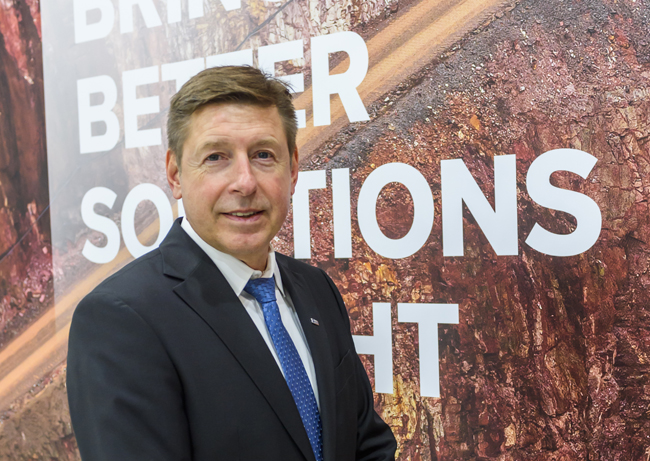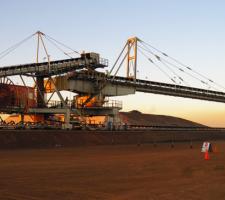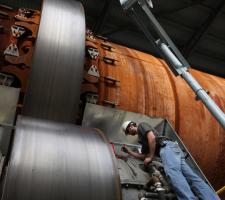
FLSmidth, a globally renowned supplier of systems, equipment, services and products to the cement and minerals industries, headed into 2019 having achieved its strongest order intake in six years in 2018, with revenue also up by 4% compared to the previous year. Aggregates Business editor Guy Woodford spoke to FLSmidth group CEO Thomas Schulz to find out what customers can expect next from the ambitious and innovative Copenhagen, Denmark-headquartered business.
A sharp mind and easy-going charm don’t always go together, but they do in Thomas Schulz’s case. Talking with him at the
Back in August 2013, Schulz, a German national and former president of
Schulz and his FLSmidth management team have continued to push for efficiencies. Last year’s return to group revenue growth and 13% year-on-year rise in order intake were aided by a strong performance in mining, largely driven by copper demand, and improved profitability in cement, coupled with the business’s diverse and strong customer lifecycle solutions. A truly global cement and mineral industries player with over 11,000 employees in offices in more than 60 countries, FLSmidth is targeting revenues of €2.54bn-€2.81bn (DKK 19-21bn) in 2019, compared to €2.51bn (DKK 18.6bn) last year.
“We see quite a positive momentum in the mining industry. Of course, there is negative talk of an upcoming global recession, trade wars, political unrest, populism, nationalism and so on. There is a feeling that we talk ourselves into a global recession, more than it really happens,” says Schulz, who in his early career days worked in coal and other areas of mining.
“If you look at the mining industry, there was a very long period of less or no investment - a kind of recession. But since mid-2017 we have seen a clear recovery. We have seen good growth in mining capital and aftermarket business. The recovery in the mining sector will build slowly year-on-year and will be built on trust.”
Schulz says the recovery of the global mining sector is driven by mine operators looking for solutions that can drive up their productivity and profitability.
“Mining businesses also want to have a good social and sustainability set-up: to invest in education, water recovery and other things,” he adds.
Schulz also notes that the mining environment worldwide is getting more transparent and increasingly regulated. This, he says, is partly due to tragic events such as the Brumadinho dam collapse on 25 January 2019 when Dam I, a tailings dam at the Córrego do Feijão iron ore mine, nine kilometres east of Brumadinho, in Minas Gerais, Brazil, suffered a catastrophic failure. At least 233 people died in the disaster.
“Tragedies like this are, of course, negative for the industry in terms of its ability to attract young people. It is also negative in terms of how non-mining people see the whole industry. We now have a different mining environment with more regulation demanding greater transparency. We as a services provider to the mining industry have a lot of areas where we can contribute – not only with new technology, innovation and digitalisation, but to educate and support customers in finding new ways of working with water and energy, and to lower their emissions. There is a big overlap in the cement and mining industries. They face similar problems and we can help them learn from each other.”
Speaking about how FLSmidth plans to maintain its growth trajectory over the next couple of years, Schulz says, “We have definitely strengthened our aftermarket business. We were not a player at all in wear parts – but have revealed that we will have more than 10% of our aftermarket business from it by the end of 2019. This enables us to have more contact with our clients. We have significantly more service and sales people compared to a few years ago, despite overall staffing levels being reduced since 2012-2013.
“We are today heavier in sales and service, R&D [research and development] and technical support staff. This is good as customers request more productivity improvement and less cheap equipment. It is now more a time for premium OEM [original equipment manufacturer] solution and services suppliers to be in demand. Besides requests for performance-enhancing solutions, customers are also very keen to gain an advantage through a greater use of automation and digitalisation across their businesses. You can digitalise everything, but the key question to ask is ‘Is it a gadget, or does is really add value to my business?’ We can look at this and start tailored programmes to help customers from day one gain advantages from digital technology solutions.”
Schulz says that FLSmidth’s equal split between big mining and cement business clients and small to medium-sized mining and cement customers is a key strength of the group, “The big project business customers are our base to give us the knowledge about all the processes involved in mining different commodities. We offer most if not all core mining and cement production equipment, and all kind of aftermarket services, up to managing and maintaining complete [mining and cement production] sites.”
In his comments accompanying FLSmidth’s encouraging 2018 trading results, Schulz said the group was taking innovation and digitalisation to the “next level”. I asked what he meant by that? “There is nothing that is not digitalised. It is not a product. It is a new way in how we work. You see it privately when you have kids. Five or six of them in one room and all they do is text each other. I use emails and I get the comment that I’m ‘antique’.
“Our innovation and digitalisation can be seen externally in our new products, whether it’s a new heap leaching system, crusher or working process. But equally important is the positive effect it has internally, with software programs, the use of robots and other elements speeding up processes, increasing efficiencies and improving cash return.
“Two or three years ago it was all about getting smart products out into the market. Products where we could immediately prove to customers how they would make more money by investing in them. Tomorrow it is about how digital we are and which type of interface we use to communicate with our customers.”
Schulz explains how staff in FLSmidth’s global control centre track the performance of hundreds of customer plant worldwide, with anomalies flagged up online and technical support teams dispatched to help solve production problems. He says this kind of digitally triggered, fast-reaction response to helping customers find ways of doing things better than before had to go into FLSmidth’s DNA “completely”.
“The average age in our industry is not 18, 20 or 22 - it’s around 48 years. We cannot think anymore in terms of preferring to use only a Microsoft or Apple product. The younger generation think differently. They are more results-orientated and don’t care about what tool they use to get them. You need to bring your long-term experienced staff from the analogue and internet-email world into the digital world. It’s a completely new world and one they have to adapt to and not feel scared about it – to see the opportunities it creates.”
Moving on to FLSmidth’s product range, Schulz stresses how the group’s commitment to R&D can be seen in the fact that a new product launch is announced every trading quarter. “It has to be a new product – not an upgrade. We upgrade quite a lot of products but do not announce them as a new product.
“To achieve standardisation and value engineering we outsource a lot, so for us it’s important we work with modular components that can be sourced in higher volumes. Higher volumes mean more cost efficiency, speed, better cashflow and less quality issues.”
Schulz has a good example with which to illustrate the success of FLSmidth’s standardisation and value engineering policy. “Years back we invested some money in vertical roller mills for cement production. We had a market position but were not satisfied with it. We were in a recession and didn’t have that many orders, but we had all the experts and we said to them, ‘Come on. We have available hours. Let’s redesign these vertical roller mills so we can source them faster, make them easier to commission and improve their performance. The last two years have seen the biggest vertical roller mills sales in FLSmidth’s history – and cement is currently not a growing market.”
Schulz is excited about the potential benefits for customers from FLSmidth’s new cloud-based digital metrics & analytics on its Raptor cone crushers. The technology for the Raptor R250, R350 and R450 models was showcased at bauma 2019.
“This digital system is connected to the cloud and whatever happens at the crusher, the information about it goes immediately online and into other plant which means they can adjust their production and vice versa. It gives our customers better utilisation of their equipment and higher productivity. It’s a classical little thing that helps our customers get more profitable.”
Schulz says it is vital for FLSmidth to explore new technologies given the vastly different mining world in which the group operates in.
“Twenty to thirty years ago, 4-5% copper content in a mined deposit was standard. Today, copper content per mined deposit is 0.2 or 0.15. We need to dig out 20 times more to get the same amount of copper. It means we have to find completely new technologies to help customers mine.”
One such new technology devised by FLSmidth and highlighted by Schulz is the Rapid Oxidative Leach (ROL) process for improving leach kinetics and recoveries of primary copper concentrates. The process is said to be capable of attaining over 97% of copper dissolution in less than six hours under atmospheric conditions.
“ROL is one key advance but the whole mining industry still uses equipment which has its IP (intellectual property) dating back to 1850 or 1870. We need to look at what we can do differently by utilising latest technologies. To best utilise such technologies, you have to invest in people – in their education, in their on-the-job training, in setting them challenges. Some people make mistakes through this, but you have to allow that. The world has got more conservative and tries to limit people. We look at it the other way and say, ‘Try it. Test it. Do it’. We think the digital world can open people’s minds again.”
Asked about his biggest achievements in his coveted role as CEO of FLSmidth and what he still has to achieve, Schulz replies, “We have fantastic people and today they understand that more. We have great collaboration among our employees and in our work with suppliers and customers. It’s a hell of an improvement on a few years ago.
“In terms of outstanding goals, we want to be the world’s number one productivity solution provider in cement as well as mining. We are in a good place in both those markets, where we have good peers and fair competition. All premium suppliers are still less than half the [mining and cement productivity solution] market, so we can really grow more. What I care most about is what our customers think about us and what we can do more for them.”










